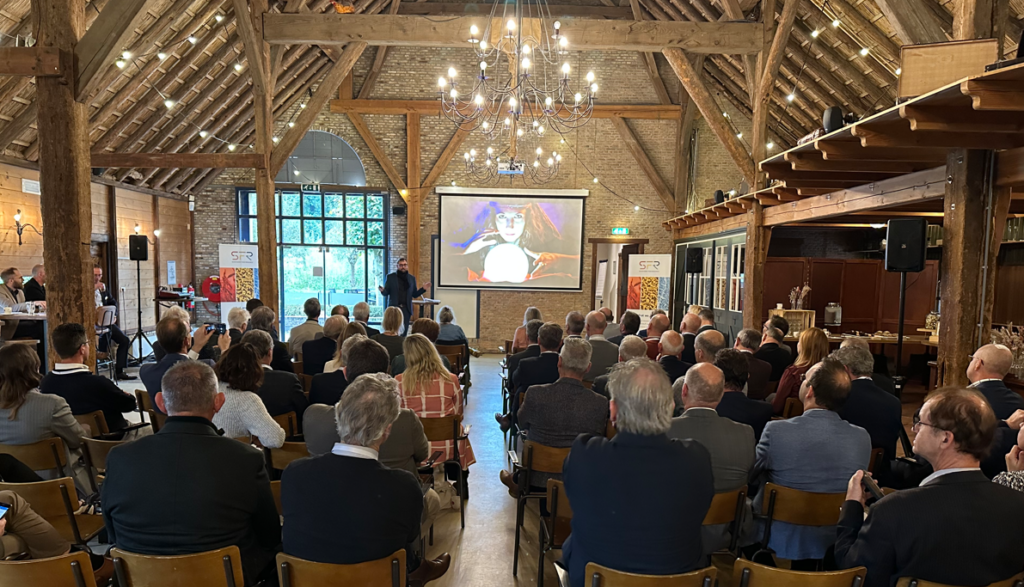Successful business event Schothorst Feed Research
For the first time, Schothorst Feed Research organized a business event, attended by a large number of industry representatives and research partners. The program offered new insights in current issues in animal nutrition, and ample time for networking. It certainly won’t be the last business event organized by SFR!
“Animal nutrition is in the centre of many challenges we face with respect to environmental and animal welfare issues”, SFR ceo Jan Kamphof emphasized in his opening words.
Challenges
In dairy nutrition, methane emission reduction, longevity and lifespan milk production, and nature-inclusive forage crop cultivation are important themes. Gut health, group housing, tail docking, and the implications of the use of co-products are main issues in pig production. Poultry research is focused on the nutrition of chicks immediately after hatch, the specific nutritional requirements of slower growing breeds and the fate of male chicks from layers.
Information technology

Big data and artificial intelligence are helpful tools to enable data-driven management. Carsten Gieseler is founder and ceo of the fodjan platform, where big data with respect to diet composition and production performance are combined into networks.
These data networks gain insight in relationships between animal performance, animal welfare and environmental issues. In many cases, a beneficial strategy for one issue may be detrimental to another, Gieseler explains: “The wellbeing of broilers benefits from slower growth rates, but slower growth rates result in lower efficiency of production. Digital tools and genetic technology are helpful to tackle such challenges, and to enable nutritionists to formulate diets that comply to multiple – often conflicting – criteria.”
“Computers and algorithms can only be used effectively by skilled data analysts, and the expertise of skilled SFR researchers will always be required to interpret data and develop nutritional strategies”, Gieseler concludes: “Man and machine need to work together.”
Life cycle assessment

SFR researcher Marco de Mik discussed life cycle assessment (LCA) and the perception of consumers. “Many consumers today are well informed about the impact of their food choices on animal welfare, environment and climate change”, he says. But still, quite some misconceptions exist. As an example, De Mik mentions palm oil: “This ingredient is often criticized because of land use and deforestation issues. Worldwide, palm oil is the most important vegetable oil, mainly because palm trees are very productive: One hectare of palm yields 3.8 tons of palm oil, whereas rapeseed only produces only 0.8 tons of oil per hectare, sunflowerseed 0.7 tons per hectare, and soybeans 0.5 tons of oil per hectare.”
Land use and competition between food, feed and fuel are discussed widely. De Mik shows that competition between feed and food is in fact relatively limited (see Figure ).
Feed efficiency
The concept of feed efficiency requires updating, says De Mik. “Kg of animal product obtained per kg of feed is not the best measure of efficiency. We need to focus on the amount of human edible food (milk, meat eggs) that is produced in relation to the amount of human edible product, energy of protein in animal nutrition.” With that approach, dairy cows fed mainly on forages, and slaughter pigs fed mainly on by-products from the food chain turn out to be very efficient food producing livestock.
In diet formulation, it is still a challenge to combine different objectives: “Feeding boars a little less lysine results in lower rates of gain, but also reduces the carbon footprint per kg of carcass weight”, De Mik shows as an example. Combining criteria with respect to production performance and efficiency, animal welfare, land use, environment and climate impact requires expertise and collaboration between farmers, researchers and nutritionists.
This first SFR business event was closed off with a farewell reception for retiring ceo Lieuwe Roosenschoon.